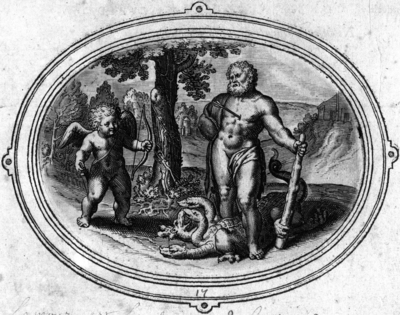Virtutis radix amor [17]

Translations
 |
De wortel [basis] van de deugd is de liefde. |
 |
Love is the root [basis] of virtue. |
 |
Plato
Een ziel die in een lichaam is ondergedompeld, wordt gewekt door de prikkels van Amor en hieruit ontstaat het eerste verlangen
naar het goede te doen. [Plato, Eros?] |
 |
Plato
A soul that is stuck in a body, is roused up by the stimuli of Eros and from this the first impulses to honourable deeds are
taken. [Plato, Eros?] |
 |
Cicero, De oratore 1, 30, 134
Zonder liefde zal niemand in het leven ooit iets buitengewoons bereiken. |
 |
Cicero, De oratore 1, 30, 134
Without love no man will ever attain anything in life that is out of the common. |
Literature
- Bagley, Hercules
 , pp. 82-83
, pp. 82-83
- Henkel and Schöne, Emblemata
 , col. 1648
, col. 1648
- Moseley, Century of Emblems
 , p. 133
, p. 133
- Sebastiàn, Lectura crítica
 , p. 21
, p. 21
Sources and parallels
-
Parallel for the subscriptio in: Des eenes glans des anders brandt [17] (in: Pieter Cornelisz. Hooft, Emblemata amatoria (1611))
[Compare
![Compare [compare]](/static/images/compare2.gif) ]
]
- Virtutis radix amor [14] (in: Otto Vaenius, Emblemata aliquot selectiora amatoria (1618))
[Compare
![Compare [compare]](/static/images/compare2.gif) ]
]
- Hercules and the Hydra: Tempera te tempor. [81] (in: Otto Vaenius, Q. Horatii Flacci Emblemata (1612))
[Compare
![Compare [compare]](/static/images/compare2.gif) ]
]
-
Love has the power to bring about changes: Amor elegantiae pater. [52] (in: Jacob Cats, Sinne- en minnebeelden (1627))
[Compare
![Compare [compare]](/static/images/compare2.gif) ]
]
-
Love has the power to bring about changes: Amor elegantiae pater. [51] (in: Jacob Cats, Proteus (1618))
[Compare
![Compare [compare]](/static/images/compare2.gif) ]
]
-
Source for: Virtutis radix amor [14] (in: Otto Vaenius, Emblemata aliquot selectiora amatoria (1618))
[Compare
![Compare [compare]](/static/images/compare2.gif) ]
]
-
Hercules as personification of Virtue also in: Virtute duce [27] (in: Otto Vaenius, Amorum emblemata (1608))
[Compare
![Compare [compare]](/static/images/compare2.gif) ]
]
References, across this site, to this page:
- Amor elegantiae pater. [51] (in: Jacob Cats, Proteus (1618))
- Amor elegantiae pater. [52] (in: Jacob Cats, Sinne- en minnebeelden (1627))
- Des eenes glans des anders brandt [17] (in: Pieter Cornelisz. Hooft, Emblemata amatoria (1611))
- Virtute duce [27] (in: Otto Vaenius, Amorum emblemata (1608))
- Tempera te tempor. [81] (in: Otto Vaenius, Q. Horatii Flacci Emblemata (1612))
- Virtutis radix amor [14] (in: Otto Vaenius, Emblemata aliquot selectiora amatoria (1618))
- Virtutis radix amor [14] (in: Otto Vaenius, Emblemata aliquot selectiora amatoria (1618))
Iconclass
Hercules leaning on his club and with the Hydra at his feet, is hit by an arrow from cupid's bow- trees
[25G3]

- (high) hill
[25H113]

- violent death by arrow(s) - EE - death not certain; wounded person
[31EE23461]

- archer's weapons: arrow
[45C15(ARROW)]

- archer's weapons: bow
[45C15(BOW)]

- quiver
[45C23]

- (personifications and symbolic representations of) Love; 'Amore (secondo Seneca)' (Ripa) (+ emblematical representation of
concept)
[56F2(+4)]

- Virtuousness; 'Amor di Virtù', 'Attione virtuosa', 'Guida sicura de' veri honori', 'Virtù', 'Virtù insuperabile' (Ripa) (+
emblematical representation of concept)
[57A6(+4)]

- proverbs, sayings, etc. (with TEXT)
[86(VIRTUTIS RADIX AMOR)]

- 'Omnia vincit Amor', Love the conqueror, Love triumphant
[92D1511]

- Cupid shooting a dart (+ variant)
[92D1521(+0)]

- attributes of Cupid (with NAME)
[92D18(ARROW)]

- attributes of Cupid (with NAME)
[92D18(BOW)]

- attributes of Cupid (with NAME)
[92D18(QUIVER)]

- (2) the Hydra of Lerna is killed by Hercules
[94L322]

- Hercules as personification of Virtue
[94L71]

![[H O M E : Emblem Project Utrecht]](/static/images/rd-small.gif)


















































































































































